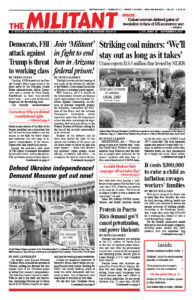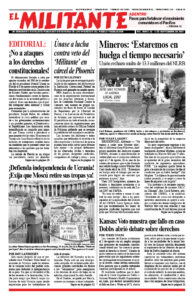UPDATE
The Militant was informed Sept. 1, after the latest issue had already gone to press, that prison authorities at the Federal Correctional Institution in Phoenix reversed the ban on issues no. 23 and 25. “Please be advised that the publication rejection at issue was revisited locally, which resulted in the publication being permitted to the intended recipient.” More on this important victory for the constitutional rights to free speech and freedom of the press in our next issue.
The fight to overturn the banning of two issues of the Militant by officials at the Federal Correctional Institution in Phoenix is winning broad support.
PEN America, the U.S. branch of the international literary and human rights organization; the National Coalition Against Censorship, an alliance of national nonprofit groups; the Reporters Committee for Freedom of the Press; and the Arizona Newspapers Association, which represents more than 80 newspapers across the state, are among the organizations that have sent letters to the Federal Bureau of Prisons calling for the ban of the socialist newsweekly to be reversed.
Readers of the Militant and all those who defend the right to free speech and freedom of the press can use these letters to reach out and win more support — from civil liberties and prisoners’ rights groups, union officials, co-workers and others — to strengthen the fight to reverse the unconstitutional suppression of the paper.
The warden at the prison banned issue no. 23 of the Militant on June 28, claiming that it “contains political extremism” and “is detrimental to the security, good order, or discipline of the institution.” Along with the rejection notice, prison authorities sent back both that issue and issue no. 25, even though it’s not mentioned in the notice.
In violation of the Bureau of Prison’s own regulations, the notice did not cite a single sentence in the paper it claims would justify the ban. In fact, Bureau of Prison regulations state unambiguously that a warden may not reject a publication solely because its content “is unpopular or repugnant.”
Militant attorney David Goldstein noted in the paper’s appeal to Federal Bureau of Prisons authorities that “it would be difficult to find a clearer admission of censorship based on objection to the political content of the Militant” than the warden’s allegation of “political extremism.”
The ban “infringes upon the First Amendment rights of both the Militant’s publisher and its incarcerated subscribers,” Lisa Simpson, executive director of the Arizona Newspapers Association, wrote to the Bureau of Prisons. “The decision appears to be arbitrary and unsubstantiated.”
The Reporters Committee for Freedom of the Press wrote that “the Militant does not publish articles that encourage prison disruptions, prison violence, insurrection nor incite criminal activity, rather, the Militant champions the battles of the labor movement and highlights the shortcomings of capitalism.” The rejection of issue no. 23 for “political extremism,” the committee added, “is precisely the kind of viewpoint-based censorship prohibited by the First Amendment.”
Nine workers at the Bimbo bread factory in Grand Prairie, Texas, members of Bakery, Confectionery, Tobacco Workers and Grain Millers Local 111, signed a petition to the Bureau of Prisons saying they “are joining the fight to defend the right of prisoners to read material of their own choosing and the right of newspapers to have subscribers behind bars.”
The Militant has been published since 1928. The paper has had subscribers in federal prisons at least since the 1940s. Today some 190 inmates in federal, state and local facilities in 27 states have subscriptions to the paper.
“Why doesn’t the prison officials’ notice of rejection point to a single objectionable word from the paper?” Militant editor John Studer said Aug. 22. “It’s because there is nothing in the paper that can justify a ban.”
The front page of issue no. 23 includes a feature article opposing Moscow’s invasion of Ukraine and another titled “Gun violence, crime are result of today’s crisis of capitalism.” Inside is a feature explaining the importance of working people opposing antisemitism. There is also coverage of the 16-month-long strike by members of the United Mine Workers at Warrior Met Coal in Alabama, and other labor battles.
“The Militant has faced other efforts by officials to suppress its working-class outlook in prisons across the country. We’ve fought every one, and won the overwhelming majority of those fights,” Studer said. “Working people behind bars have the constitutional right to read literature of their choosing, to form their own opinions about the big political questions in the world, and to express their views.”
Millions of working people have friends or relatives who are in the prison system, the Militant editor noted. “Many would be happy to sign and help win others to write letters calling for the ban to be overturned.”
In a similar violation of constitutional rights, Arizona state prison authorities have banned at least five issues of the Nation,a liberal magazine, over the last year and a half. Overturning the ban on the Militant at the Federal Correctional Institution in Phoenix would strike a blow for free speech and freedom of the press that would strengthen efforts to overturn the ban on the Nation and other efforts to defend prisoners’ rights to publications of their choice.
To protest the banning of the Militant at the federal prison in Phoenix, send letters to Melissa Rios, Western Regional Director, Federal Bureau of Prisons, 7338 Shoreline Dr., Stockton, CA 95219, or via email to WXRO-ExecAssistant@bop.gov. Send copies to themilitant@mac.com.

